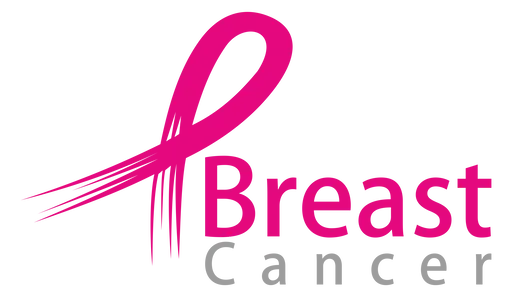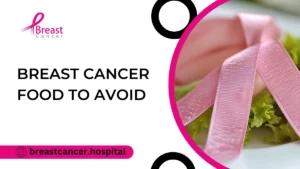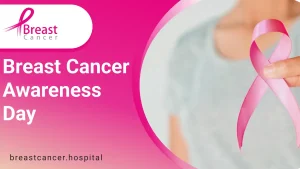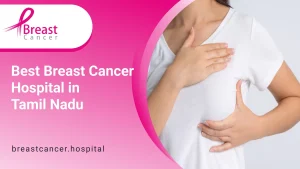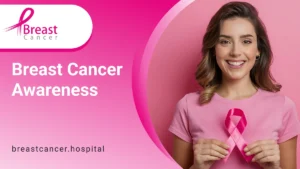Breast cancer is often perceived as a condition affecting older women, but an increasing number of young women are diagnosed with the disease each year. If you’re a woman under 40, it’s important to understand the risks, symptoms, and treatment options for breast cancer. This blog will guide you through the essentials of breast cancer in young women, using a framework that moves from raising awareness to encouraging action.
Raising Awareness About Breast Cancer in Young Women
Breast cancer in young women is a rare but real concern. Statistics show that about 5-7% of breast cancer cases occur in women under 40. Although the chances of getting breast cancer increase with age, young women are not immune. What makes breast cancer in young women different is the aggressiveness of the disease, which is often detected at later stages. The symptoms can sometimes be overlooked, and young women may not always consider themselves at risk.
If you’re under 40, particularly in your 20s or 30s, and think that breast cancer isn’t something you need to worry about yet, think again. While breast cancer is less common in young women, it’s vital to be aware of the signs and risk factors.
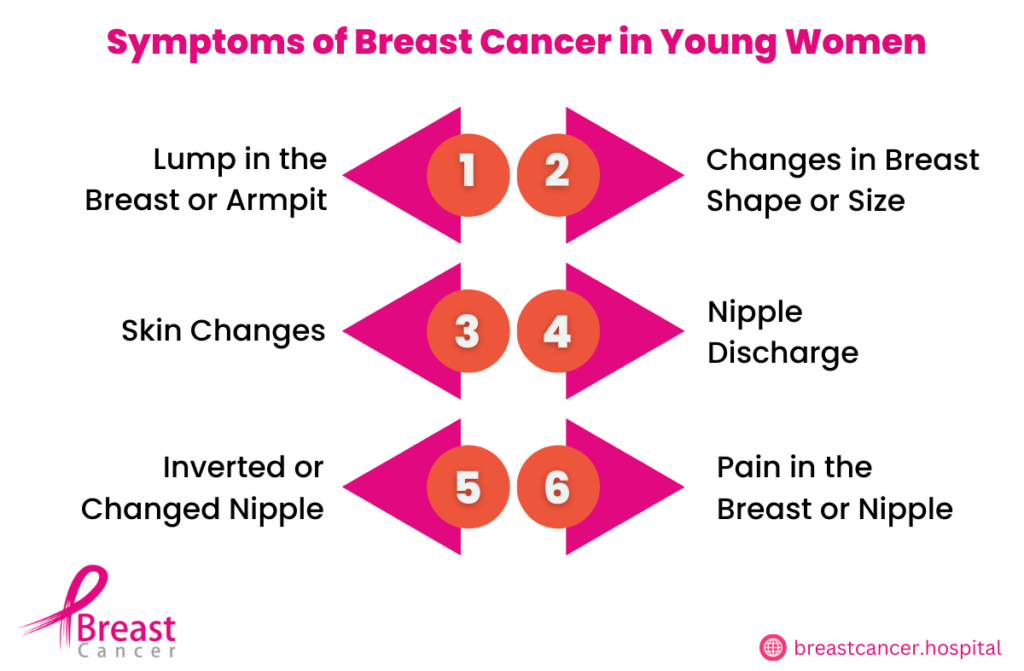
What Are the Risks of Breast Cancer Under 40?
Although breast cancer primarily affects older women, several factors can increase the risk for breast cancer under 40:
- Family history: If you have a close relative who has had breast cancer, your risk is higher.
- Genetic mutations: BRCA1 and BRCA2 gene mutations increase the risk of breast cancer significantly. Women with these mutations may develop breast cancer at a younger age.
- Hormonal factors: Hormonal imbalances, particularly related to menstruation and pregnancy, can play a role.
- Radiation exposure: Women who have had radiation therapy to the chest, especially for childhood cancers, are at higher risk of developing breast cancer at a younger age.
What is Early-Onset Breast Cancer?
Early-onset breast cancer refers to cases diagnosed in women under the age of 40. While the average age for a breast cancer diagnosis is around 62, young women are not immune. Genetic predispositions, such as mutations in the BRCA1 and BRCA2 genes, lifestyle factors, and environmental exposures can increase the risk.
Unlike post-menopausal breast cancer, early-onset breast cancer often presents unique challenges:
- Aggressive Tumor Types: Tumors in younger women tend to grow faster and are often more aggressive.
- Delayed Diagnosis: Due to lower perceived risk, symptoms are sometimes overlooked or misattributed.
- Fertility Concerns: Treatment can affect reproductive health, adding an emotional dimension to the diagnosis.
Breast cancer at 30 symptoms to Watch Out For
Many women under 40 don’t consider themselves at risk of breast cancer, but the reality is that breast cancer at 30 symptoms can sometimes be the first sign. The symptoms in younger women can be similar to those in older women, but they’re often dismissed or attributed to less severe conditions.
Here are the most common symptoms of breast cancer at 30 or younger:
- Lump in the breast or armpit: The most common symptom is a lump in the breast or armpit that doesn’t go away.
- Changes in breast size or shape: You may notice that one breast appears different from the other.
- Nipple discharge: Any unusual discharge from the nipple, especially if it’s bloody, should be checked by a doctor.
- Breast pain: While not always a sign of cancer, persistent breast pain that isn’t linked to your menstrual cycle can be a warning sign.
- Skin changes: Dimpling, redness, or thickening of the skin on the breast or nipple could indicate an underlying problem.
If you experience any of these symptoms, don’t wait to get them checked out. Early detection is key to effective treatment.
Understanding the Minimum Age for Breast Cancer
While breast cancer can occur at any age, there’s no officially established minimum age for breast cancer. It can develop even in women in their teens or 20s, though such cases are extremely rare. However, this underscores the importance of being vigilant about breast health, regardless of your age.
Women with a family history of breast cancer, particularly those with genetic mutations like BRCA1 or BRCA2, are advised to begin screening much earlier than the general population, sometimes as early as in their mid-20s.
Types of Breast Cancer Common in Young Women
Young women are more likely to be diagnosed with aggressive forms of breast cancer, such as:
- Triple-negative breast cancer (TNBC): This type lacks estrogen, progesterone, and HER2 receptors, making it harder to treat and more aggressive.
- HER2-positive breast cancer: This type is characterized by the overexpression of the HER2 protein, leading to rapid growth and spread of cancer cells.
Both types of cancer require aggressive treatment, including chemotherapy, radiation, and targeted therapies.
Why You Should Take Action Now
Being diagnosed with breast cancer at a young age presents unique challenges, but it also provides opportunities for proactive healthcare. Regular self-exams and understanding your risk factors can make all the difference in detecting breast cancer early.
Here are a few steps you can take to lower your risk or catch potential problems early:
- Self-breast exams: Become familiar with the look and feel of your breasts so you can notice changes quickly.
- Genetic testing: If you have a family history of breast cancer, consider getting tested for BRCA1 or BRCA2 gene mutations.
- Healthy lifestyle choices: Maintain a balanced diet, stay physically active, and avoid excessive alcohol to help lower your risk.
- Regular medical check-ups: Discuss your risk factors with your healthcare provider and stay on top of regular screenings.
Encouraging a Proactive Approach
While breast cancer in young women is rare, it’s vital to stay proactive about your health. Your breast health is something you should never ignore, no matter your age. The earlier breast cancer is detected, the better your chances of survival. Treatment for young women often involves surgery, chemotherapy, radiation, and hormone therapy, and acting early can mean less invasive treatments with a higher success rate.
If you’re worried about your risk of breast cancer, now is the time to schedule an appointment with your doctor. Discuss your family history, lifestyle, and any symptoms you’re experiencing. Early detection is your best defense, and taking charge of your health today can make all the difference tomorrow.
What You Can Do Today to Protect Your Breast Health
- Schedule a check-up with your doctor to discuss your breast health, especially if you are experiencing any of the symptoms mentioned.
- Perform regular self-exams to become familiar with your breast tissue and detect any unusual changes early.
- Consider genetic testing if breast cancer runs in your family to better understand your risk and take preventative measures.
- Live a healthy lifestyle by eating a balanced diet, exercising, and avoiding smoking and excessive alcohol consumption.
- Spread awareness by educating friends and family about the risks of breast cancer in young women. You could save a life by simply sharing information.
5 Facts About Breast Cancer in Younger Women
- It’s Less Common but Still Serious: Breast cancer in young women accounts for about 4-7% of all cases. Despite its rarity, it often requires more intensive treatment.
- Breast Cancer Under 40 is Often Genetic: Up to 10% of young women diagnosed may carry a BRCA gene mutation.
- Unique Symptoms: Breast cancer at 30 symptoms may include:
- A lump or mass in the breast.
- Changes in breast shape or size.
- Unexplained breast pain or discharge.
- Increased Risk in Specific Populations: Women with a family history of breast cancer or Ashkenazi Jewish heritage face higher risks.
- Screening Isn’t Routine for Young Women: Mammograms are typically recommended starting at age 40, which can delay detection for younger women.
How Common is Breast Cancer in Young Women?
Though breast cancer in young women is relatively rare compared to older age groups, the impact is profound. Women under 40 represent a small percentage of cases, but their cancer is often detected at more advanced stages due to delayed diagnosis.
Key statistics include:
- Breast cancer under 40 constitutes about 5% of all breast cancer cases.
- The minimum age for breast cancer diagnosis is not well-defined, but cases have been reported in women as young as their teens.
- An increasing number of younger women are participating in genetic testing and early screening due to heightened awareness.
Conclusion
Breast cancer doesn’t wait for age, and neither should you. Whether you’re 20, 30, or nearing 40, knowing the risks and being proactive about your health is essential. Breast cancer in young women is aggressive, but it’s also treatable if caught early. Don’t ignore the symptoms, and take the necessary steps today to protect yourself.
Read also : இளம் பெண்களில் மார்பக புற்றுநோய்
